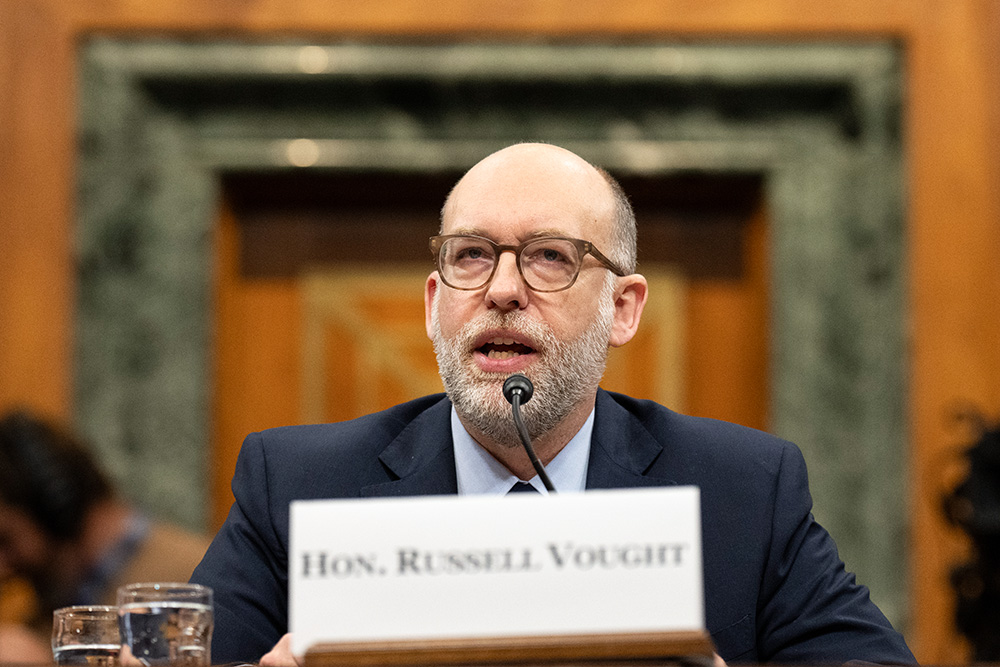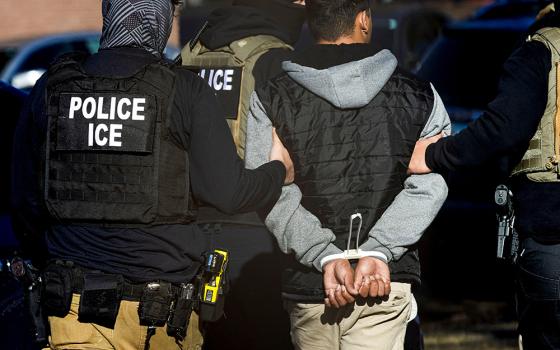
Russell Vought, President Donald Trump's choice for director of the Office of Management and Budget, appears before the Senate Budget Committee during a hearing examining his nomination, on Capitol Hill in Washington Jan. 22, 2025. (AP/Jacquelyn Martin)
The New York Times recently profiled Russell Vought, the head of the Office of Management and Budget. The Times noted that Vought had previously run his own organization, the Center for Renewing America, adding: "There, Mr. Vought refined an ambition to marry extreme fiscal austerity with Christian values, pledging to eliminate federal programs seen as too wasteful, 'woke' or secular."
The Office of Management and Budget director wields enormous power over the federal bureaucracy, so what he does has enormous consequences. In this administration, it is often scary to inquire as to why a person does something, but in this case, it is important.
The marriage of fiscal austerity with Christian values strikes many of us as absurd, even morally repugnant, at least when the initial round of austerity included shuttering the U.S. Agency for International Development, which helped alleviate the suffering of millions of desperately poor people around the globe. But the marriage is not without a distinctly American and Christian pedigree. Thrift and austerity ranked high among the virtues for the Puritans who landed in New England in the first half of the 17th century.
Alexis de Tocqueville astutely observed, "I think we can see the whole destiny of America contained in the first Puritan who landed on these shores." A lot has changed since 1835, when de Tocqueville first published Democracy in America. Today, America is far more secular and Calvinism has long since lost its hold on those engines of culture: Harvard, Yale and Princeton. Still, in many ways, we still walk in the paths formed by "pilgrim feet, whose stern impassioned stress, a thoroughfare for freedom beat, across the wilderness!"
It is an acute irony of Calvinism (and of its Catholic iteration, Jansenism) that once the essence of faith was worn down, the habits of faith lingered and Calvinism became reduced to ethics, and a hyperindividualistic ethics at that.
The pattern is complex, but it mirrors (and is related to) what Notre Dame historian Brad Gregory explained in his book The Unintended Reformation: How a Religious Revolution Secularized Society. The competing truth claims of the various reformers — all of whom relied on sola scriptura as authoritative — ended up relativizing the faith. Privatization of the faith soon followed.
Advertisement
In America, for the Puritans, the individualism of Protestantism was tempered by their covenant theology, which bound them as a group. That, too, did not survive the headwinds of sectarianism and secularism as an ecclesiological fact, but it lingered as an ethical principle. JD Vance's misunderstanding of the ordo amoris is a kind of stepchild of lost covenant theology, which included the elect and the elect only.
Another cultural shift was at work. Historian John Bossy described the "migration of the holy" in early modern Europe in his book Christianity in the West 1400-1700. The confessional state gave way to the secular state, and the power over, and devotion to, religion shifted with it. Protestant churches became national churches and Gallicanism in France aimed at a Catholicism subservient to the French state. National identity overwhelmed and subsumed religious identity.
This shift happened later in America. In a recent essay at Comment, religious historian Nathan Hatch recalled the New England divines whose views developed in the 18th century. "Their views did not show secularization by contraction of the influence of religious concepts but rather by their expansion, transferring to the political realm some of the supernatural and transcendent values normally owned by the church," he writes.
Applying that lesson to today, Hatch argues:
Some thirty years ago, sociologist Robert Wuthnow said that the basic intellectual and cultural divide among Christians in America is not the fault line of their theology but the cultural divide between a conservative and progressive worldview, a chasm deeper and more formative than any theological debate. I agreed with him in the 1980s. And I think today his point could be made with much greater emphasis. A divide has become a chasm. Dominant political and cultural values, left and right, have washed over churches and come to dominate their respective worldviews.
This is profoundly true and the phenomenon afflicts almost all believers. Hatch calls it "the political captivity of the faithful." Religion does not generate culture in America any longer. It is invoked to baptize beliefs arrived at for political ends or via secular methods. Religion is late to the cultural party, no longer the host.
President Donald Trump's Office of Management and Budget director may not realize any of this. Nonetheless, no matter what he thinks about predestination, his stingy view of the world fits neatly within the ethical parameters of classical Calvinist ethics, an ethics now divorced from covenantal obligations, and still more from the Catholic or liberal commitment to a universalist ethic. That universalist impulse, too, was part of the Founding Fathers' worldview, brought via liberalism not Catholicism, and it has been completely abandoned by Trump and his team.
Liberalism cannot abandon its universalism, despite its current fascination with identity politics that focus on the group, rather than the individual and the universal.
The political genius of Catholicism is that it insists on the dignity of the individual, the significance of rootedness in particular and familial groups, and the universal application of our ethical norms. It is a genius the country needs, but history is littered with clamant needs that no one recognized at the time.
Ours is not an epoch that warms to Catholicism's "both/and" approach to the intellectual and moral life. The contours of both our ideological polarization and of our social media have created an "either/or" world. That fact is killing our culture.





